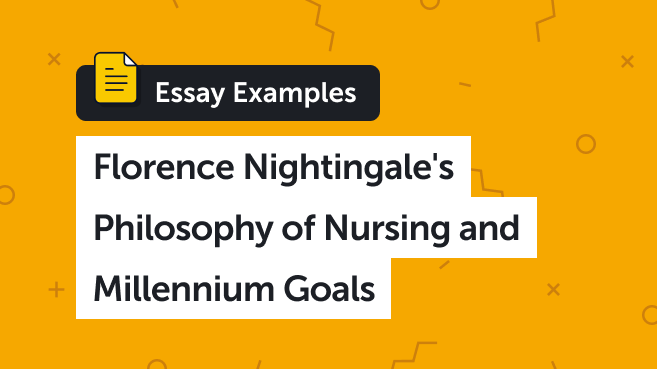Florence Nightingale’s Philosophy of Nursing and Millennium Goals

Abstract
It is worth noting that Florence Nightingale’s legacy is one of the most addressed aspects of the nursing profession. By her personal philosophy of nursing and dedicated efforts towards improving the efficiency of the profession, Nightingale helped to shape the perspectives of practitioners towards the United Nation’s Millennium Goals. As such, the aim of this paper is to evaluate Nightingale’s legacy effect on the author’s perception of the Millennium Goals, identify possible areas of influence on the certain Goals, as well as explaining of how the community of nurses can advance the Goals.
Florence Nightingale’s Philosophy of Nursing and Millennium Goals
With rapid industrialization and urbanization, there are no natural or political ideologies that can stop the spread of diseases across boundaries. As such, there is a need to establish an integrated nursing philosophy that can accommodate people across different cultural boundaries. Florence Nightingale’s nursing methodology is an example of phylosophycal approach that unites community nurses and focuses their efforts towards the achievement of health care goals. The present paper addresses Florence Nightingale’s approach to health, medicine, and healing as one of the most critical philosophies that seek to improve the efficiency of the nursing profession across generations, as well as its effect on my personal perception of Millennium Goals, identifying possible areas of influence, and explaining of how the community of nurses can advance the Goals.
Indeed, Florence Nightingale’s legacy has positively influenced as well as shaped my perception of the Millennium Goals, especially when it comes to healthcare. Notably, she had an integrated and expanded vision about the future of the nursing profession and global health care. More so, she worked tirelessly to realize the envisioned healthcare goals and promote the effectiveness of the profession (Beck, Dossey, & Rushton, 2011). As such, she has been an inspiration to many nursing students and professionals who wanted to defy the odds and leave a positive impact on their careers and the people whom they serve. Personally, Nightingale’s legacy shapes my perspective about nursing and the Millennium Goals. For instance, she designed hospitals and helped to improve patients’ environment. Therefore, this serves as a challenge as to what I can do to help improve patients’ health outcomes during treatment.
Furthermore, Nightingale emphasized the need to work cohesively with collaborative groups to implement healthcare reforms. In fact, she networked with peers in nursing as well as media professionals who believed in as well as supported her course (Beck, Dossey, & Rushton, 2011). As such, I believe that to achieve the Millennium Goals, there is a need to join efforts with all stakeholders. Healthcare should be under the responsibility of the state and federal governments, communities, and medical professionals. Rather than working in autonomy, every group should recognize the role that they play in the realization of the Millennium Goals.
Analysis of Specific Millennium Goals
Reduce Child Mortality Rates
One of the most critical functions of any healthcare system is to reduce child mortality rates. However, this is a subject that proves elusive even for nations with advanced health structures. As a nurse, I would like to focus on reducing and preventing child mortality rates, especially in low and medium income communities. Notably, this can be achieved by conducting community programs that help vulnerable population and educate the public about causes and means of preventing child mortality.
Improve Maternal Health
Notably, improving maternal health is imperative to reducing the rates of infant and child mortality. Some of the problems are due to lack of sensitization on the matter. As such, parents should also be educated on the importance of attending antenatal care to prevent future complications. Personally, I would lobby for the training of mothers on proper health and dietary habits that improve the health of the mother and the child.
Ensure Environmental Sustainability
It is worth noting that the environment plays a significant role in the health of populations. This explains why people in low-income communities are more prone to diseases and infections that result from poor sanitation. I plan to conduct regular community programs that sensitize and educate the public about sanitation and healthcare. In fact, this is a minor issue that can be quickly addressed in collaboration with the relevant stakeholders.
Collaborative Approaches
The first and most effective way of advancing the UN Millennium Goals is to form work groups with the nursing communities. Notably, these workgroups would be assigned specific duties and goals which they are expected to achieve within a given time frame. For instance, a group of ten nurses can focus on hospital hygiene to prevent hospital-acquired infections. Secondly, individuals within the profession should also be encouraged to practice holistic healthcare. Specifically, individual practitioners should focus on improving patient experience and outcome. In essence, collective efforts can help to achieve the Millennium Goals.
In conclusion, Florence Nightingale’s philosophy of nursing has significantly shaped the professional nursing practice. It encourages not only institutional efforts but also inspires individual practitioners to set own goals that help to improve patients’ outcomes. Moreover, it is evident that collaborative approaches are imperative to achieve long-term health care goals.